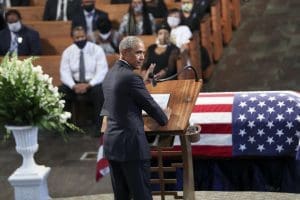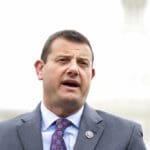Obama eulogizes John Lewis with call for voting reforms he fought for
Obama advocated for restoring the Voting Rights Act and automatic voter registration, among many other suggestions for improving access to voting for Americans.

Former President Barack Obama spent the latter part of his eulogy for the late civil rights icon and Democratic Rep. John Lewis by advocating for policies Lewis himself fought for, such as expanding the right to vote.
Obama ticked off his list of policies members of Congress should pass to honor Lewis’ legacy of fighting for voting rights after delivering a fiery condemnation of Donald Trump and his administration.
Without saying Trump’s name, he condemned Trump’s actions of using the same brutal police tactics against racial justice protesters today as Lewis faced as a young civil rights leader fighting for Black equality.
“I’m so grateful for the legacy and work of all the congressional leaders who are here, but there’s a better way than a statement calling him a hero,” Obama said. “You want to honor John? Let’s honor him by revitalizing the law that he was willing to die for.”
Here are the the policies Obama said Congress should pass to honor John Lewis:
Restoring and revamping the Voting Rights Act
In 2013, the Supreme Court gutted a key enforcement mechanism of the Voting Rights Act — the landmark law that Lewis’ activism helped create back in 1965.
The Court’s decision invalidated Section 5 of the law, which prevented nine states that had a history of discriminating against Black Americans from creating laws that would hamper minorities from voting. By invalidating that provision, those states could once again create laws that made it harder for minorities to vote — and they immediately did, with Texas creating a strict voter ID law.
The day of that decision, Lewis said the Supreme Court “put a dagger in the heart of the Voting Rights Act of 1965.”
Obama said Congress should restore and revamp the Voting Rights Act — which Lewis had been fighting for ever since the court invalidated it — and name it after Lewis.
Automatic voter registration
Obama said that reforms to honor Lewis don’t end with the Voting Rights Amendment.
“John wouldn’t want us to stop there,” Obama said.
He went on to call for the passage of automatic voter registration — a growing movement among voting rights advocates that would make it so every American citizen is automatically granted the right to vote.
The policy would make it so that voters would have to opt out of being registered to vote, rather than opting in. Currently, 16 states and the District of Columbia have approved the policy, according to the Brennan Center for Justice.
The Brennan Center writes, “The benefits of AVR extend beyond increasing the number of people registering. The policy keeps voter rolls more accurate by creating a constant stream of updates between registration agencies and election officials and by reducing the odds of mistakes caused by processing paper registration forms by hand. Cleaner rolls reduce errors that cause delays on Election Day and prevent eligible voters from casting regular ballots.”
Re-enfranchisement
Another growing movement in the voting rights community is pushing to give former inmates who completed their prison sentences the right to vote again.
Currently, 10 states permanently disenfranchise people with criminal convictions, according to the Brennan Center. One state, Iowa, permanently disenfranchises anyone who has a felony conviction.
Florida voters overwhelmingly voted to re-enfranchise more than a million residents in their state. But the Republican legislature passed a law that would force those who had completed their prison sentences to pay back all fines before their rights could be restored — something critics have called a poll tax and is currently being challenged in court.
Expanding voter access
Obama called for Congress to make Election Day a federal holiday, “so if you are somebody who is working in a factory or you’re a single mom who’s got to go to her job and doesn’t get time off, you can still cast your ballot.”
D.C. and Puerto Rico statehood
Democrats have been fighting to make District of Columbia and Puerto Rico new states, allowing the millions of residents there — who pay federal taxes and are governed by federal laws — to have congressional representation.
The House in June passed a historic bill to make the District of Columbia a state.
Republicans, however, have vowed to never make D.C. or Puerto Rico states, as both would receive two senators each as well as House members who would almost certainly be Democrats.
Some GOP lawmakers even openly used racist reasoning for not allowing D.C. and Puerto Rico — which are both majority minority — to become states.
Ending partisan gerrymandering
Partisan gerrymandering has allowed Republicans to draw House districts in a way that dilutes Democratic voters and keep Republicans in power.
A report by the Center for American Progress from October 2019 found that “unfairly drawn congressional districts shifted, on average, a whopping 59 seats in the U.S. House of Representatives during the 2012, 2014, and 2016 elections.”
Since leaving office, Obama has fought to end the practice of partisan gerrymandering.
Ending the filibuster
Obama called the filibuster — which allows the minority party in the Senate to block legislation — a “Jim Crow relic.”
Ending the filibuster has gained considerable support over the years, as Senate Majority Leader Mitch McConnell used the filibuster to block Obama’s judicial nominees when Obama was president.
McConnell (R-KY) later eliminated the filibuster for Supreme Court nominees, allowing Trump to appoint two Supreme Court justices, neither of whom would have been confirmed if the filibuster stood. Justice Neil Gorsuch received 55 cloture votes, while Brett Kavanaugh received just 51 — both far short of the 60 needed had the filibuster existed.
A lot of these reforms were included in H.R. 1 — the first bill House Democrats passed when they retook the majority in 2019, but which Senate Republicans have refused to take up.
Below is the full transcript of the segment of Obama’s eulogy calling on Congress to honor Lewis by passing reforms.
You want to honor John? Let’s honor him by revitalizing the law that he was willing to die for. And by the way, naming it the John Lewis Voting Rights Act — that is a fine tribute, but John wouldn’t want us to stop there. Just trying to get back to where we already were. Once we pass the John Lewis Voting Rights Act, we should keep marching to make it even better.
By making sure every American is automatically registered to vote, including former inmates who have earned their second chance.
By adding polling places and expanding early voting and making Election Day a national holiday so if you are somebody who is working in a factory or you’re a single mom who’s got to go to her job and doesn’t get time off, you can still cast your ballot.
By guaranteeing that every American citizen has equal representation in our government, including the American citizens who live in Washington, D.C. and in Puerto Rico. They’re Americans.
By ending some of the partisan gerrymandering so that all voters have the power to choose their politicians, not the other way around. And if all this takes eliminating the filibuster, another Jim Crow relic, in order to secure the God-given rights of every American, then that’s what we should do.
Even if we do all this, even if every bogus voter suppression law is struck off the books today, we have to be honest with ourselves that too many of us choose not to exercise the franchise.
Too many of our citizens believe their vote won’t make a difference or they buy into the cynicism that, by the way, is the central strategy of voter suppression — to make you discouraged, to stop believing in your own power.
So we’re also going to have to remember what John said: If you don’t do everything you can do to change things, then they will remain the same. You only pass this way once. You have to give it all you have.
As long as young people are protesting in the streets, hoping real change takes hold, I’m hopeful but we can’t casually abandon them at the ballot box. Not when few elections have been as urgent on so many levels as this one. We can’t treat voting as an errand to run if we have some time. We have to treat it as the most important action we can take on behalf of democracy. Like John, we have to give it all we have.
Published with permission of The American Independent Foundation.
Recommended

Florida abortion ban puts GOP Rep. Anna Paulina Luna’s anti-choice views in spotlight
Luna supports abortions bans with no exceptions for rape
By Jesse Valentine - May 07, 2024
Republican Caroleene Dobson wants Alabama abortion ban to go nationwide
Dobson is the Republican candidate in what will be one of the most-watched House races of 2024.
By Jesse Valentine - April 30, 2024
Direct mailers distort California Democrat Will Rollins’ record
Rollins, a former federal prosecutor, is challenging incumbent GOP Rep. Ken Calvert.
By Jesse Valentine - April 25, 2024












































































